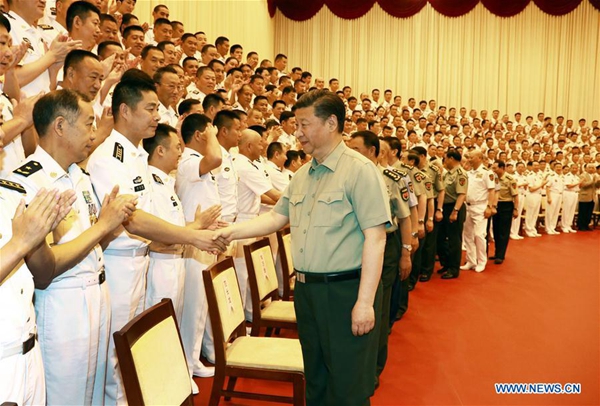|

|
|
Chinese President Xi Jinping (R, front), who is also general secretary of the Communist Party of China (CPC) Central Committee and chairman of the Central Military Commission, shakes hands with delegates to the 12th Party congress of the People’s Liberation Army (PLA) Navy, during an inspection of the PLA Navy headquarters, in Beijing, capital of China, May 24, 2017. [Photo/Xinhua]
|
Chinese President Xi Jinping on Wednesday called for efforts to build the People’s Liberation Army (PLA) Navy into a strong and modern force to lend support for the realization of the Chinese dream of national rejuvenation and the dream of a strong army.
Xi, who is also general secretary of the Communist Party of China (CPC) Central Committee and chairman of the Central Military Commission (CMC), made the remarks during an inspection of the PLA Navy headquarters.
Xi expressed congratulations on the 12th Party congress of the PLA Navy, met delegates to the congress and conveyed greetings to all navy members.
Noting that the navy is a strategic military service concerning national security and overall development, Xi asked naval authorities to build a world-class force by promoting political awareness, reforms and rule of law.
Xi visited the navy’s operational command center, where he greeted via video navy officers who were performing duties at sea.
He first talked with members of flotilla 150, which was in an overseas journey of good-will visit. The members told Xi that they had visited five countries in more than one month and were warmly welcomed by the host countries. Xi asked them to pass on friendship and contribute to world peace.
Xi also talked with staff who were carrying out a patrol mission aboard ship 538.
“You continuously fight wind and waves. Thanks for your hard work!” Xi said. “I hope all you comrades perform duties loyally and merit the trust of the Party and the people.”
After hearing a report on naval work, Xi said a strong navy is a symbol of a world-class army and is a pivot for building the nation into a great maritime power.
He asked navy authorities to advance the transformation of the PLA Navy and focus on combat capabilities.
He said the navy should improve overall fighting capacity by combining the “mechanization and informationization,” promoting both offshore and high sea forces and balancing operations on the water surface, below the sea and in the air.
Innovation is key to improving and transforming the navy, according to Xi. He noted the transformation must be carried out in accordance with the law. The navy must resolutely safeguard the CPC Central Committee’s authority and unwaveringly stick to the Party’s absolute leadership, Xi stressed.
He called for efforts to thoroughly purge the pernicious influence of Guo Boxiong and Xu Caihou, former corrupt senior CMC officials, and promote the anti-corruption drive.
He asked naval authorities to improve their own abilities while training a large number of capable military staff.
